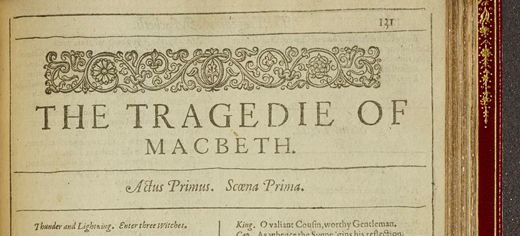
A priceless First Folio of Shakespeare's plays is now available online, following months of painstaking digitization work at the University of Leeds.
The First Folio is one of the most important publications in the history of the English language. Although cheap editions of individual plays had previously been published, the First Folio gathered Shakespeare’s work together in one volume.
Martin Butler, Professor of English Renaissance Drama at the University, explained its significance: “The first folio contains 18 plays that had never been printed before, some of them amongst the most famous in the canon.
"Without the folio, we would not have Macbeth or Julius Caesar, Antony and Cleopatra or Coriolanus; we would be missing Twelfth Night and As You Like It, Measure for Measure and The Comedy of Errors; we would be without The Winter’s Tale and The Tempest. We would never had heard of ‘Et tu, Brute’, or ‘All the world’s a stage’, or ‘If music be the food of love, play on’."
Although 230 copies of the First Folio still exist worldwide, only 40 are still in Britain and just two are in Yorkshire. The University’s copy is in unusually good condition – complete and containing all original leaves.
To mark the 450th anniversary of the playwright’s birth today the University is opening up this historic work for all. Support from the University’s Footsteps Fund – which brings together donations from thousands of former students – has allowed the fragile 900 pages of the Folio to be photographed and made available online at http://library.leeds.ac.uk/special-collections-shakespeare
The Tempest is the first play to be displayed in full; a complete digital resource of all the plays will be launched in May.
The online formatting allows the content to be explored and discovered in a range of exciting ways, giving users not only easy access to the original text, but also to other learning materials and the footnotes and annotations which have been added to the pages by the book’s different owners over the years. Given the significance of the First Folio, both to the University and external audiences, the library has created a resource which will be valuable for both research and teaching.
The University acquired the First Folio when local philanthropist Lord Brotherton bequeathed his own library to the institution in the 1930s.
“It had previously belonged to Theodore Vail, an American communications tycoon,” explained Literary Archivist Sarah Prescott. “Lord Brotherton bought it in 1922 after Vail’s death. It was the jewel in his collection.”
The gilt-edged pages are bound in goatskin, with gold floral designs on the spine – and the book is presented in a red leather box.
It had originally sold for £1 – roughly equivalent to three weeks’ wages for a working man. Publishers John Heminges and Henry Condell claimed that previous publications of Shakespeare’s works were: “stolen and surreptitious copies, maimed and deformed by frauds and stealths of injurious impostors.” One earlier version of Hamlet had – for example – cut its most renowned speech in half and reduced its famous first line to the more prosaic: “To be or not to be, there’s the point.
Heminges and Condell asserted that their folio offered Shakespeare’s true words were now “cured, and perfect of their limbes”.
Prescott agreed: “It’s as close as you can get to the versions of the plays which were being performed 400 years ago. The condition of our First Folio, its provenance and annotations– make it quite simply unique.”
The Folio is one of the many treasures of the Brotherton Library at the University of Leeds. As well as copies of the Second, Third and Fourth Folio editions of Shakespeare’s works, Leeds has a vast collection of rare books and manuscripts, including hand-written copies of works by Oscar Wilde, Graham Greene, the Brontes and many others. Leeds also has a first edition of Shakespeare’s collected non-dramatic poetry and original copies of ‘apocrypha’; contemporary plays A Yorkshire Tragedy and Sir John Oldcastle – which were at one time also thought to have been written by Shakespeare.
“It’s amazing for me to be able to come into contact with such materials as part of my working life,” says Prescott. “But it’s not a trophy cabinet. These books and manuscripts are the backbone of research and study – and academics use these materials all the time. The internet now gives us a wonderful opportunity to make them available to all.”
Further information
The digitization has been made possible by gifts to the University’s Making a World of Difference Campaign – the institution’s first major fundraising initiative in the post-war years. Gifts to the Campaign are supporting key University research projects in the areas of Human Health, Global Society and Business, Climate Change and Arts and Culture, while also providing support for young people from less privileged backgrounds to aim for a place at University, and creating a range of inspirational opportunities for our students. The total raised for the Campaign now stands at more than £43m. www.campaign.leeds.ac.uk
The precise date of Shakespeare’s birth is not known, though the baptismal register of Stratford’s Holy Trinity parish church shows his Christening on April 26, 1564. Traditionally, April 23, St George's Day, has been accepted as Shakespeare's birthday. He died on the same date in 1616.
For further details, contact University of Leeds, on 0113 343 4031 or via pressoffice@leeds.ac.uk